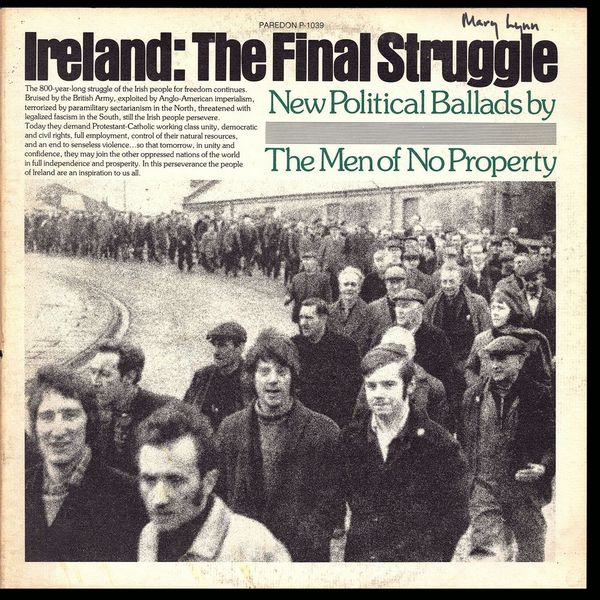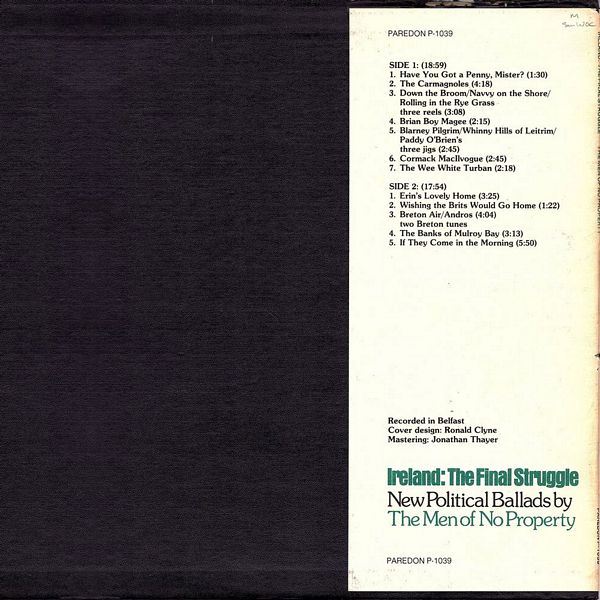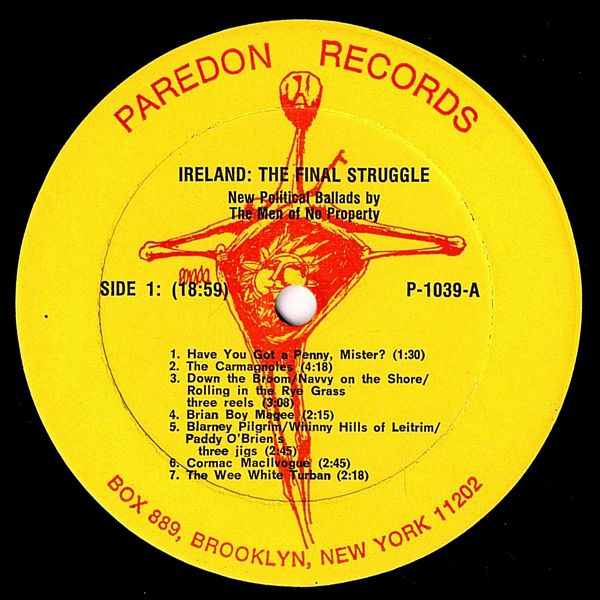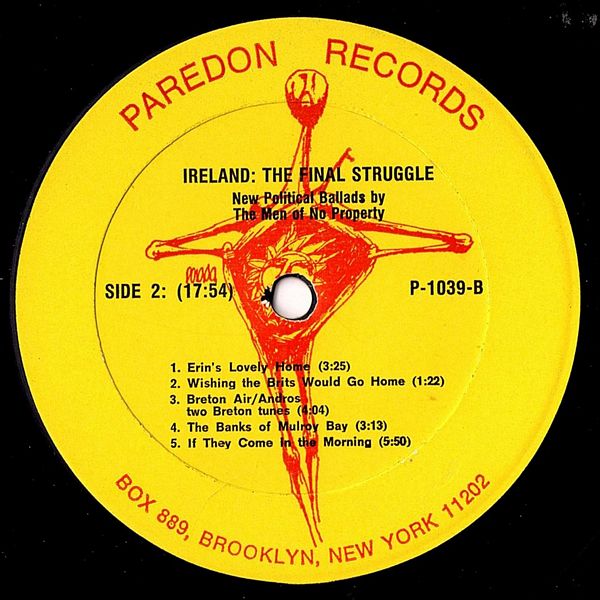

|



|
Sleeve Notes
The struggle against British Imperialism in the North of Ireland begun in 1968 still goes on. The cost in terms of lives and suffering has increased as the repression has been stepped up in a last desperate attempt to turn the tide. There are now 2,000 political prisoners in Northern Ireland. The British Army murder squads (Special Air Service known as S.A.S.) have murdered and bombed at will but still the people of the North have refused to return to the corrupt Six County State they rose to smash in 1909. Our struggle is not an easy one nor is the solution simple, but we refuse to be dragged down the deadly cul-de-sac of sectarianism. We refuse to accept the war in Ireland as a religious one, although the mighty propaganda machine of the British press attempts to convey that impression to the world. Internment without trial has failed, Bloody Sunday has failed, and the concentration camps of Long Kesh and Magilligan cannot crush the people's resistance. We find ourselves in a most difficult period of the struggle, with a right-wing puppet government in Dublin and the people wary of long years of war. But let there be no mistake. British Imperialism will be defeated. This the final struggle. We have paid too dearly, suffered too much, to climb back into the gutter again.
— The Men of No Property
Have You Got A Penny, Mister?
Sung by Wylde
Tune: Traditional
Words: Wylde
A new ballad expressing the frustration of the working class people of Belfast bowed by 25% unemployment, job discrimination, and the continual harassment of the "Brits" on the street. People are aware of the "set up" and this struggle is about changing all that.
The Carmagnoles
Sung by Betsy Gray
Tune: Traditional French
Collected and Arranged by Wylde
During the French Revolution residents of the little village in the south of France called Caramagnole wrote words about "Madame Veto" (Marie Antoinette) who was the wife of Louis XVI, and whose veto caused the suspension of the constitution of 1791. The tune also served as a vehicle for both singing and dancing of the Paris Communards, and in this way they came also to be called "Carmagnoies." The present words are attributed at times to the great Scottish poet Robert Burns, but this not certain. We have included it in our program to show that while the color of the uniform may change, the enemy of the people remains unchanged throughout history.. and it can and will be overthrown. "Church and state in deep embrace; the burden of the human race."
Down The Broom, Navvy On The Shore, Rolling In The Rye Grass
Three Irish reels learned from older traditional musicians in the North. They are played on the Uileann Pipes, the button row accordion, the flute, mandolin and bodhrán.
Brian Boy Magee
Recited by MacIlvogue
Poem by Ethna Carbery
Blarney Pilgrim, Whinny Hills Of Leitrim, Paddy O'Brien's Jig
Three Irish Jigs
Cormack MacIlvogue
Sung by Wylde
Tune: Traditional [A Man's Life in the Army]
Words: MacIlvogue
Belfast lies between a range of low hills and the sea. Local folk tales tell of how these hills were inhabited in the early 18th century by bands of guerrillas called "Raparees," fighters who refused to surrender after William the Conquerer's victory at Boyne. Many stories about this exist in the oral tradition, but few songs, so we decided to compose our own.
The Wee White Turban
Sung by Whorsky
Tune: traditional
Words: MacIlvogue
The tune is from a popular "rebel" song called "The Broad Black Brimmer," and if the people of Belfast weren't tired of singing it they'd be tired of listening to it. The parody is a light-hearted dig at the kind of Irish Rebel song which seems to have more sentiment than politics. At the same time, it relates the class struggles of another people to our own. The author is in complete sympathy with the PLO and its aims, and by no means takes the Palestinian situation lightly.
Erin's Lovely Home
Sung by Betsy Gray
Music and Words: Traditional
A rare emigration ballad from the famine time. In 1847, a famine decimated the population of Ireland when four million people either left or died in three horrific years.
Wishing The Brits Would Go Home
Sung by Frank Trick
Tune: Traditional
Words: Macilvogue
A humourous but barbed little song in support of the growing demand for a withdrawal of British troops from Ireland. The song describes how when the British troops were first drafted to the North many saw them as protectors from the pogroms rampant at the time. Disillusion soon set in as their real role became cleat, that of maintaining British imperialism in Ireland.
Breton Air, Andros
Two traditional instrumental Breton melodies The ancient Celtic culture is flourishing once again among the young after long years of official repression and disapproval. Our group picked up these melodies during a visit to play in Brittany, France. Breton traditional music bears a marked resemblance to its Irish counterpart, which helps demonstrate how widespread the Celtic tradition and culture is.
The Banks Of Mulroy Bay
Sung by Wylde
Tune: Traditional
Collected and Arranged by MacIlvogue
Lord Leitrim, whose vast estates stretched from Donegal to Country Mayo and Leitrim, was one of the most infamous landlords in Ireland at the end of the Nineteenth Century. He ordered wholesale eviction of any of his tenants who had fallen into rent arrears, but finally he pushed the people too far. Three days after obtaining a dozen eviction orders from the court in Sligo Town, he was ambushed and shot to death near the small village of Milford in County Donegal. It is no surprise that the men who did the deed were never caught. The rash of local ballads which commemorated the event were scarely laments.
If They Come In The Morning
Sung by Whorsky
Words and Music: Jack Warshaw
©1974 Jack Warshaw
This timely ballad was composed by an American friend of ours who has lived in England since he came there as a draft resistor. In it, Jack Warshaw tells of repression around the world, and of the way torture has come to be an accepted method of treatment for political prisoners in many so-called democracies. The song makes us see that the only way the people can win is by sticking together, by supporting each other wherever struggle is being waged.